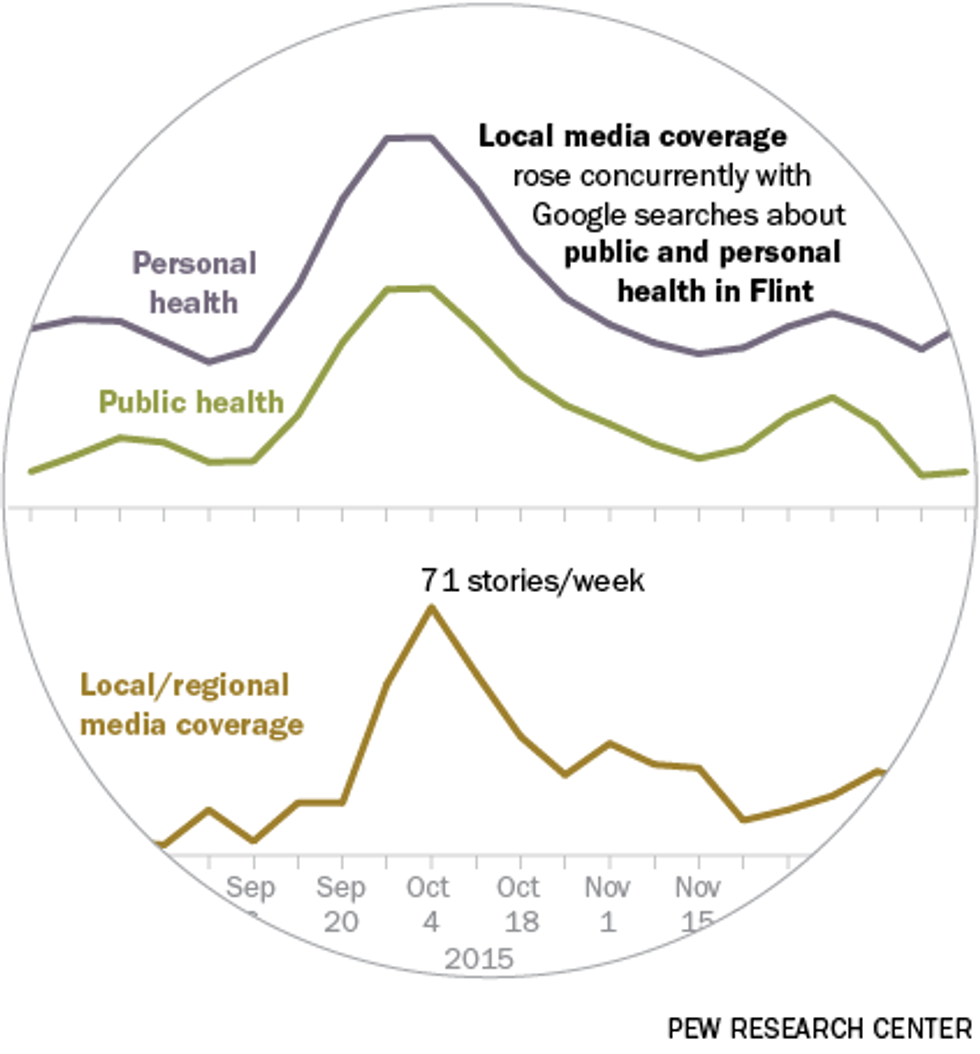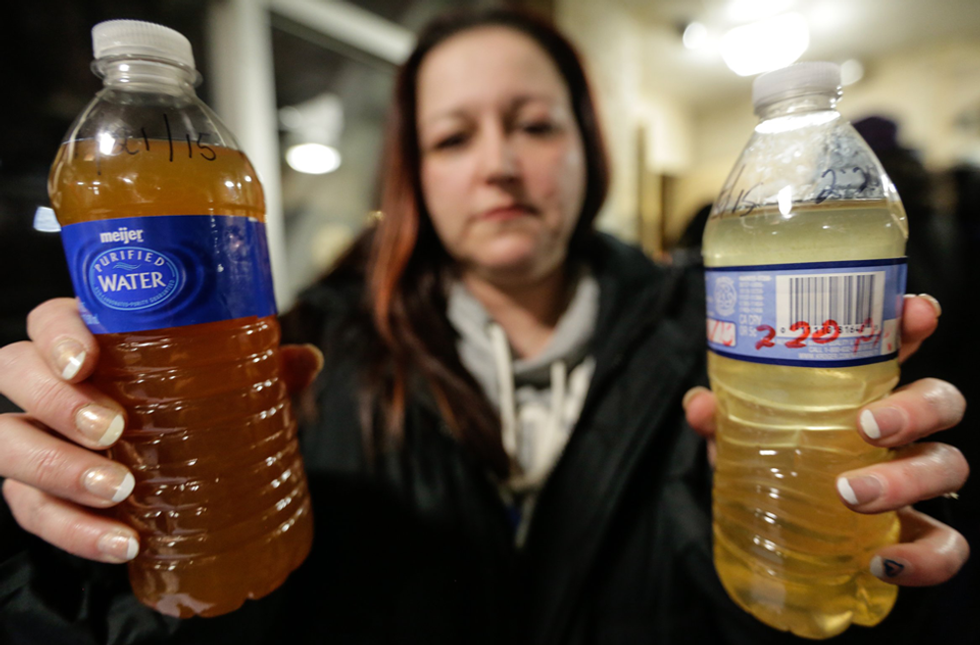
In a new Pew Research Center study, centered around anonymous Google search information from Jan. 5, 2014, through July 2, 2016, researchers inquired about different sources in searches that were most popular as a substitute for public interest, concerns, and intentions. This first invasion by the Research Center into the Google Health programming was as much an exploration of how reasoning users’ search data can shed light on the public’s response to news and events as it was a study of the Flint water crisis. When health reports were first introduced, exposing the pollutants which were seeping into Flint Michigan’s tap water, most of the coverage was localized to those who were in immediate access to the unfiltered water. The news coverage coincided closely with the accelerated jump in public desire to learn more about their own personal health and the state of health in their communities. As soon as word about water safety concerns began to gain traction searches online began to boost around the nation. Once reports express that the majority of people who searched for the Flint water crisis did so in the later months of 2015 and the beginning months of 2016, I thought it would be relevant to conduct my own poll about searches with our local community. The graph on the left is a detailed line graph depicting the concurrent rise in Google searches versus the increased rate of media coverage. Despite the Flint Michigan Water Scandal happening in 2014, on April 29th, 2017 I prepared a small survey with three questions where I would find out the average time of people either hearing about or researching the story. Between 38 people surveyed, 17 had responded that they had heard about and researched the crisis in late 2015, 19 people said that they had heard about the story, but had not researched it on their own in early 2016, 7 people said they had not heard about the story, and 5 people said they couldn’t remember when they had been exposed to the news. The majority of people had heard about the crisis and 68% of people expressed that they had either heard about the story or even looked into it themselves concerns and  intentions. This first invasion by the Research Center into the Google Health programming was as much an exploration of how reasoning users’ search data can shed light on the public’s response to news and events as it was a study of the Flint water crisis. When health reports were first introduced, exposing the pollutants which were seeping into Flint Michigan’s tap water, most of the coverage was localized to those who were in immediate access to the unfiltered water. The news coverage coincided closely with the accelerated jump in public desire to learn more about their own personal health and the state of health in their communities. As soon as word about water safety concerns began to gain traction searches online began to boost around the nation. Once reports express that the majority of people who searched for the Flint water crisis did so in the later months of 2015 and the beginning months of 2016, I thought it would be relevant to conduct my own poll about searches with our local community. The graph on the left is a detailed line graph depicting the concurrent rise in Google searches versus the increased rate of media coverage. Despite the Flint Michigan Water Scandal happening in 2014, on April 29th, 2017 I prepared a small survey with three questions where I would find out the average time of people either hearing about or researching the story. Between 38 people surveyed, 17 had responded that they had heard about and researched the crisis in late 2015, 19 people said that they had heard about the story, but had not researched it on their own in early 2016, 7 people said they had not heard about the story, and 5 people said they couldn’t remember when they had been exposed to the news. The majority of people had heard about the crisis and 68% of people expressed that they had either heard about the story or even looked into it themselves in the same time in which local media coverage around the country was streaming with pressured information about personal and communal health. The data proved that with the increase in coverage the increase in personal awareness became. Pew Research’s detailed report on the effects of search information around the country gives more insight to the local findings I came to recount on a much larger scale. Please feel more than welcome to look into the data they managed to extract at: of the unfiltered water. The news coverage coincided closely with the accelerated jump in public desire to learn more about their own personal health and the state of health in their communities. As soon as word about water safety concerns began to gain traction searches online began to boost around the nation. Once reports express that the majority of people who searched for the Flint water crisis did so in the later months of 2015 and the beginning months of 2016, I thought it would be relevant to conduct my own poll about searches with our local community. The graph on the left is a detailed line graph depicting the concurrent rise in Google searches versus the increased rate of media coverage. Despite the Flint Michigan Water Scandal happening in 2014, on April 29th, 2017 I prepared a small survey with three questions where I would find out the average time of people either hearing about or researching the story. Between 38 people surveyed, 17 had responded that they had heard about and researched the crisis in late 2015, 19 people said that they had heard about the story, but had not researched it on their own in early 2016, 7 people said they had not heard about the story, and 5 people said they couldn’t remember when they had been exposed to the news. The majority of people had heard about the crisis and 68% of people expressed that they had either heard about the story or even looked into it themselves at the same time in which local media coverage around the country was streaming with pressured information about personal and communal health. The data proved that with the increase in coverage the increase in personal awareness became. Pew Research’s detailed report on the effects of search information around the country gives more insight to the local findings I came to recount on a much larger scale. Please feel more than welcome to look into the data they managed to extract at http://www.journalism.org/essay/searching-for-news...
intentions. This first invasion by the Research Center into the Google Health programming was as much an exploration of how reasoning users’ search data can shed light on the public’s response to news and events as it was a study of the Flint water crisis. When health reports were first introduced, exposing the pollutants which were seeping into Flint Michigan’s tap water, most of the coverage was localized to those who were in immediate access to the unfiltered water. The news coverage coincided closely with the accelerated jump in public desire to learn more about their own personal health and the state of health in their communities. As soon as word about water safety concerns began to gain traction searches online began to boost around the nation. Once reports express that the majority of people who searched for the Flint water crisis did so in the later months of 2015 and the beginning months of 2016, I thought it would be relevant to conduct my own poll about searches with our local community. The graph on the left is a detailed line graph depicting the concurrent rise in Google searches versus the increased rate of media coverage. Despite the Flint Michigan Water Scandal happening in 2014, on April 29th, 2017 I prepared a small survey with three questions where I would find out the average time of people either hearing about or researching the story. Between 38 people surveyed, 17 had responded that they had heard about and researched the crisis in late 2015, 19 people said that they had heard about the story, but had not researched it on their own in early 2016, 7 people said they had not heard about the story, and 5 people said they couldn’t remember when they had been exposed to the news. The majority of people had heard about the crisis and 68% of people expressed that they had either heard about the story or even looked into it themselves in the same time in which local media coverage around the country was streaming with pressured information about personal and communal health. The data proved that with the increase in coverage the increase in personal awareness became. Pew Research’s detailed report on the effects of search information around the country gives more insight to the local findings I came to recount on a much larger scale. Please feel more than welcome to look into the data they managed to extract at: of the unfiltered water. The news coverage coincided closely with the accelerated jump in public desire to learn more about their own personal health and the state of health in their communities. As soon as word about water safety concerns began to gain traction searches online began to boost around the nation. Once reports express that the majority of people who searched for the Flint water crisis did so in the later months of 2015 and the beginning months of 2016, I thought it would be relevant to conduct my own poll about searches with our local community. The graph on the left is a detailed line graph depicting the concurrent rise in Google searches versus the increased rate of media coverage. Despite the Flint Michigan Water Scandal happening in 2014, on April 29th, 2017 I prepared a small survey with three questions where I would find out the average time of people either hearing about or researching the story. Between 38 people surveyed, 17 had responded that they had heard about and researched the crisis in late 2015, 19 people said that they had heard about the story, but had not researched it on their own in early 2016, 7 people said they had not heard about the story, and 5 people said they couldn’t remember when they had been exposed to the news. The majority of people had heard about the crisis and 68% of people expressed that they had either heard about the story or even looked into it themselves at the same time in which local media coverage around the country was streaming with pressured information about personal and communal health. The data proved that with the increase in coverage the increase in personal awareness became. Pew Research’s detailed report on the effects of search information around the country gives more insight to the local findings I came to recount on a much larger scale. Please feel more than welcome to look into the data they managed to extract at http://www.journalism.org/essay/searching-for-news...





















